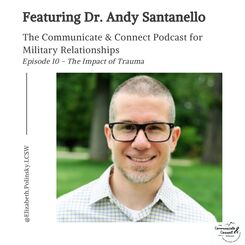IN THIS PODCAST
SUMMARY:
MAIN POINTS: 1.What is trauma? Webster's definition defines this broadly as “an emotional upset”--which is probably too broad. It is important to look at the spectrum of stressful things a person can experience during their lifetime. The low end of the spectrum is everyday life stressors; the middle area of the spectrum might be things like moving, divorce, or the loss of a loved one. The impact of the stressors makes a difference--whether it has a positive or negative impact on your life. Moving or divorce could be very stressful but not result in a mental health diagnosis. The very top end of that spectrum is where we get into the trauma arena. The DMS-5 (manual for mental health disorders) describes trauma as an experience of witnessing or being exposed to death, serious injury, or sexual assault. The ICD-10 (international classification of diseases from the world health organization) definition is a bit broader--it includes those same three categories but also includes experiences that would put someone in situations to be physically or psychologically injured. Regardless of the definition, they are extreme stressors that are outside of everyday life. Most people, when they experience trauma, are going to recover.” -- Dr. Andy Santanello
2. Trauma could result in recovery, PTSD, or other mental health diagnoses such as a depression or anxiety disorder.
It is when people get chronically stuck in the recovery process that they develop PTSD. Right after a traumatic event, it is normal to experience a lot of memories of the event coming to mind. Sometimes these memories are triggered by being around something that reminds the person of the event. There are also changes in how emotions are experienced, such as a proneness to looking for threat in the environment and people feel keyed up. Others feel emotionally numb. There are often changes to how someone experiences anxiety--like being easily startled, feeling jumpy, or feeling like they always have to be on guard and look for danger. Lastly, people tend to cope through avoidance. Generally this is good judgement; but when they try to avoid the thoughts and feelings from the trauma, it makes it harder for them to recover.
3. Trauma also impacts couples and families.
Intimacy--both sexual and emotional intimacy--can be hard for trauma survivors. With friends and families there can be a sense of being alone, that others won't understand, and that it's better to push others away. It’s hard to feel like you want to be emotionally or physically close to someone if you are feeling incredibly vulnerable” --Dr. Andy Santanello
4. What can partners do to be helpful?
5. If you have experienced trauma and are continuing to struggle, make sure to get help for yourself first. Couples therapy can be helpful as well.
If you are not meeting your own needs and not taking care of yourself, it's going to be really hard to be helpful to anyone else” -- Dr. Andy Santanello
Words of Wisdom from Dr. Andy Santanello:
Working with Dr. Andy Santanello:
Dr. Santanello has a small private practice in Baltimore, MD. For more information on working with him, see http://www.santanellopsych.com/ .
Podcast Sponsor: The Relate Assessment is the most comprehensive relationship assessment in the world and is based on 10 predictors of marital stability. It’s supported by the American Association for Marriage and Family Therapy and is the one my husband and I used during our premarital couples counseling. To get 20% off the assessment, go to https://relateinstitute.com/ and enter “POLINSKY20”. Thanks for Listening!  Photo by SYLO Productions Photo by SYLO Productions
Elizabeth Polinsky is a marriage and couple therapist specializing in working with military members, veterans, and their families. Liz is located in Norfolk, Virginia, and provides online counseling services throughout Virginia, South Carolina, and Arkansas.
DISCLAIMER: My podcast, blogs, videos, newsletters, and products are general information for educational purposes only; they are not psychotherapy and not a replacement for therapy. The information provided does not constitute the formation of a therapist-patient relationship. You should consult your doctor or mental health provider regarding advice and support for your health and well being. I cannot answer questions regarding your specific situation. If you are experiencing a medical or mental health emergency, you should call 911, report to your local ER, or call the National Crisis Hotline at 1-800-273-8255. Nothing I post should be considered professional advice. The information in my podcast, blogs, videos, newsletters, and products are not intended to be therapy or psychological advice. The podcast, blogs, videos, newsletters, and products are not a request for a testimonial, rating, or endorsement from clients regarding counseling. If you are a current or former client/ patient, please remember that your comments may jeopardize your confidentiality. I will not “friend” or “follow” current or past clients to honor ethical boundaries and privacy; nor will I respond to comments or messages through social media or other platforms from current or past clients. Current and past client’s should only contact me through the professional contact information provided on the website. Lastly, accounts may be managed by multiple people. Therefore, comments and messages are monitored by staff and are not confidential. Comments are closed.
|
The Communicate & Connect Podcast
In Communicate & Connect For Military Relationships, I provide educational tips for relationships, communication, and navigating military family life. AuthorHey, I'm Dr. Elizabeth "Liz" Polinsky and I am a marriage counselor in Virginia Beach. I provide online counseling across the states of VA, MD, NC, SC, AR, and NV. Categories
All
|
Telephone(757) 354-1157
|
liz@communicateandconnectpodcast.com
|



 RSS Feed
RSS Feed
